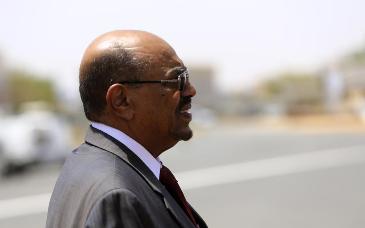Bashir orders release of political detainees, ease in restrictions on parties and media
April 6, 2014 (KHARTOUM) – Sudanese president Omer Hassan Al-Bashir hs announced a series of resolutions at the onset of a political roundtable held on Sunday in Khartoum with the participation of 83 political parties.

He also pledged to enhance press freedom so that it can play its role in the success of the national dialogue unconditionally as long they abide by the norms of the profession.
Political detainees who have not been found to be involved in criminal acts will be released, Bashir added.
The Sudanese leader also stressed the government’s commitment and willingness to allow rebels to participate in the national dialogue and vowed to give them adequate and appropriate safeguards to attend and depart safely afterwards.
Bashir said in his keynote address before the summit that the meeting is the first step in jumpstarting the comprehensive national dialogue process, as well as reahing agreement on the primary principles to guide the dialogue.
Another goal of the process is to bring sustainable peace in Darfur, South Kordofan and Blue Nile states and to ensure a bright future for their people, achieve national unity, strengthen Sudan’s regional and international relations especially with South Sudan, Bashir said.
The leader of the National Umma Party (NUP), Al-Sadiq Al-Mahdi, urged the government to lift its ban on foreign aid organisations, particularly the International Committee of the Red Cross (ICRC), and enable them to provide support to those in conflict-affected zones.
He also called for the revoking of suspension decisions imposed on cultural centres.
Hassan Al-Turabi, head of the Popular Congress Party (PCP), demanded the declaration of an immediate ceasefire in Darfur, Blue Nile and South Kordofan states, after which humanitarian corridors should be opened to deliver aid to those affected by the conflict.
He also underscored the need for the formation of a national transitional government tasked with addressing the thorny crises affecting the country.
In his speech, the Islamist figure called for more freedoms, allowing private and public media houses to be open to all, inviting rebel groups to attend the dialogue by offering them guarantees that they will not be harmed.
Turabi welcomed steps announced by Bashir in response to demands of opposition parties as prerequisite for dialogue.
He also stressed the need for international monitoring of the national dialogue led by the United Nations.
Reform Now Party (RNP) leader Ghazi Salah Al-Deen Al-Attabani highlighted the need to bring on board parties opposed to the dialogue, demand the departure of security agencies from political life.
Attabani also called for constitutional amendments and the conduct fair elections pointing out that they are running out of time.
He stressed that re-contacting parties opposed to dialogue should be a priority, emphasising that the assembly will consider all proposals submitted by the various political forces .
The head of the Arab Socialist Nasserite Party Mustafa Mahmoud said that Sudan’s troubled political and economic situation requires radical solutions, affirming his party’s desire to see concerted efforts by national forces to come together and engage in constructive and civilised dialogue table without paying attention to narrow interests.
Mahmoud added that they believe in dialogue as a means for peaceful change, saying that its failure would push them to seek traditional means to overthrow the regime, noting that the leaders since independence had succeeded in achieving the national agenda by sitting down together.
He called for the formation of a two-year transitional national government to undertake the implementation of dialogue and the establishment of a transitional national council to handle legislation issues.
In a televised address to the nation in January, Bashir announced a four-point plan for reform “to stop the war and bring peace, free political society, fight against poverty and revitalise national identity”.
He called for political forces and even rebel groups, on the condition they lay down their arms, to engage in dialogue aimed at meeting key objectives.
NCP officials, including Bashir, have brushed aside opposition calls for the 2015 elections to be delayed and the formation of a transitional government that would work on drafting a new constitution to prepare the country for the polls.
The NUP and the PCP are the only major opposition parties to accept Bashir’s call for national dialogue so far.
Although both parties warned that they would pull out of dialogue with the NCP if progress stalls.
(ST)
